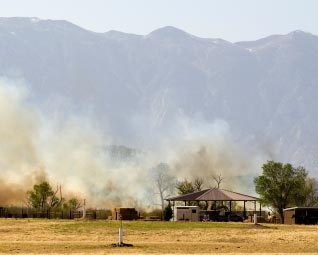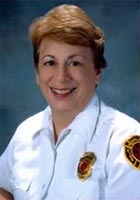 |
 |
|
Check out- Fire Protection for Horse Barns
Barn Fire Prevention
Buy Your Horses a Fan That Won’t Kill Them
By Laurie Loveman author of Fire House Novels Book Series
Now that the weather is warming up, many of you are preparing to buy and install box fans in your
barns. Before you buy a box fan, though, make absolutely sure it’s designed for agricultural use!
The motor must be sealed to prevent dirt and dust from getting into the motor and starting a fire.
The inexpensive box fans we use in our homes are too dangerous to use in our barns. Two fillies
died in Paris Pike, Kentucky, in July when a box fan overheated and ignited straw, and that’s just
one example of hundreds of similar incidents. When dust gets into the motors of these light-duty
fans, the motors seize up and burn out. The plastic housing then melts and falls onto bedding. If
the fan is mounted on the outside of the stall, and the aisle way is not swept clean (our horses always dropped hay between the front bars of their stalls or over their door), the hot plastic can
ignite the hay pieces and send flames in both directions in the aisle way. In the meantime, the
burning plastic housing of the fan will be emitting toxic smoke that can kill a horse within minutes. You could have a barn full of dead horses before you even realize a fire has started.
Another problem with residential type box fans is that the electrical cord is light-weight and without  much insulation. It takes very little to break
through the insulation, exposing the electricity conducting wire. If a short circuit occurs in a cord that is hanging near or lying on hay, bedding, cobwebs or accumulated dust a fire
can easily start. Any animal in your barn (invited or otherwise) is capable of breaking the insulation with as little as a single bite. much insulation. It takes very little to break
through the insulation, exposing the electricity conducting wire. If a short circuit occurs in a cord that is hanging near or lying on hay, bedding, cobwebs or accumulated dust a fire
can easily start. Any animal in your barn (invited or otherwise) is capable of breaking the insulation with as little as a single bite.
An added hazard to the light duty fan cord is
created when you have to use an extension cord to reach an outlet. Even if the extension cord is heavy duty, if it is draped over beams or nails or woven through stall-front bars, if it
is left in place slight rubbing of the cord insulation over time can expose the wires, allowing a short circuit. As a general rule, extension
cords should never take the place of wiring enclosed in conduit, especially in places where the cord
can be reached by any of the barn occupants. In fact, extension cords must always be considered temporary, to be used only for a specific purpose and removed when the job is done.
The fans to use are designated for agricultural and industrial settings and their motors are sealed so
no dust can get in. If you look at the back of the fan and see wires, the motor is not sealed. There
are many brands of agricultural fans that are available with different kinds of mounts so you can
hang the fan from either a beam or a wall. Standard features on almost all agricultural fans include
galvanized construction, enclosed motors with thermal protection, welded wire guards on the intake
and exhaust sides, and a heavy-duty power cord. You can buy these fans at an agricultural or electrical supply store or through catalogs.
Here’s something to consider regarding box fans. If you are boarding your horse in a large stable
where everyone is using box fans, it doesn’t do you much good if you have a top-of-the-line
agricultural fan when other people are using box fans they bought at the local hardware or discount
store. If the motor in one of those light duty fans burns out, your horse is in just as much trouble as if you had a residential box fan yourself.
Every stall has to have the correct type of fan if the barn is to remain safe.
Another option for cooling your barn is installing a wall-mounted box fan at one or both ends of the
barn, or there are large (42”) portable circular fans that do a great job of moving air to keep the
barn comfortable. Again, you want to purchase an agricultural or industrial grade fan that meets OSHA requirements.
Finally, you do have another choice. You can recognize that if your horses are kept inside during
the hot daylight hours they really don’t need a fan. They are not exerting very much energy by
being in their stalls, except for munching hay. If they spend nights in pasture they will spend most of
the day sleeping in their stalls. So, if you have decent ventilation, being shielded from the sun and
heat with the walls and roof of the barn is pretty much as Nature intended. We are the ones who
need a fan! While our horses are snoozing after a night outdoors, we’re the ones exerting energy
keeping the barn and stalls clean! Even if your horses don’t have the “luxury” of spending their
summer nights outdoors, the temperature in the barn will still fall to comfortable levels during the night.
John and Kimberly Linger suffered the loss of 44 horses when a fire started by a residential type box fan destroyed their barn. Kimberly wants everyone to be warned of the dangers, and my
correspondence with Kimberly is posted on my website, www.firesafetyinbarns.com following my
article on Electric Appliances. You will also find on my download page, a warning sign that you
can provide to your local tack and feed shops and to any store in your area that sells residential
type box fans. Remind the retailers that they will be seen as very good neighbors if the warning prevents a barn fire!
Laurie Loveman is an author and writer of novels and articles and is a recognized expert in the area  of fire safety in horse barns. Her articles have been published in many
leading fire and equine journals and one of her fire safety articles was adapted for a booklet by the Humane Society of the United States. Her
novels also deal with the topics of horses and firefighters in the 1930s in the fictional town of Woodhill, Ohio. of fire safety in horse barns. Her articles have been published in many
leading fire and equine journals and one of her fire safety articles was adapted for a booklet by the Humane Society of the United States. Her
novels also deal with the topics of horses and firefighters in the 1930s in the fictional town of Woodhill, Ohio.
Contact: Laurie Loveman
17095 Abbey Road
Chagrin Falls, Ohio 44023-1313
Phone: 440-543-1640
Email: lloveman@windstream.net
Website: laurieloveman.com
|
 |
|
To advertise your horse product or service, Contact Ann
|
 |
|
InfoHorse.com, Horse Information Lives Here ® 12/13/2025
Contact Us to Advertise to over a million Horse Owners.
All images and content Copyright© 2014 by InfoHorse.com, Equusite.com.
Horse Owners are Dog Owners; Dog Product Information dognowner.com
|
|
|
Articles, Academic Schools, Arena Maintenance, Animal Communicators, Barns, Barn and Accessories, Barn Equipment and Tractors, Breast Collars, Grooming Products for Horses, Hay Feeders, Horse Blankets, Horse Books, Horse Videos, Horse Breeders, Horse Camping Gear, Career Schools, Carts and Buggies, Horse Training Clinicians, Equestrian Clothing, Dogs and Puppies, Horse Fencing, Western Art & Furniture, Horse Property for Sale, Horse Products For Sale, Fly Control, Foal Care, Horse Footings, Horse Gifts, Horse Health and Nutrition, Hoof and Leg, Horse Insurance, John Lyons Certified Trainers, Equine Lawyers, Leather Care, Links, Horse Property, Horse Photography, Portable Horse Stalls, Arenas and Roundpens, Horse Riding Schools, Horse Schools, Safety Products, Services for Horses, Horse Trailers, Horse Shipping, Horse Skin Coat Care, Horse Software, Specialty Trainers, Horse Summer Camps, Tack, Horse Trainers, Treats and Snacks, Truck Accessories, Trucks, Horse Vacations, Western Lifestyle, jewelry
|
|
|
|